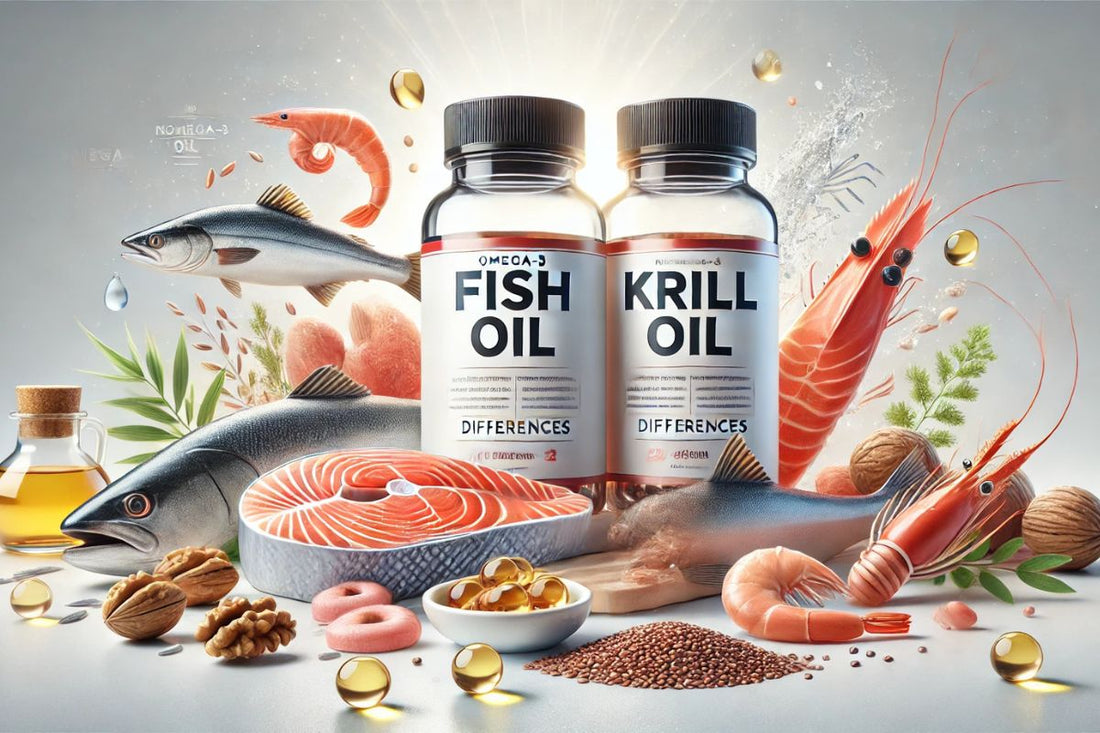
Omega-3 Fish Oil and Krill Oil Differences
Share
Omega-3 fatty acids are essential for your health. They support your heart, brain, joints, and even your mood. While both Fish Oil and Krill Oil are excellent sources of omega-3, they come from different sources and have unique benefits.
In this blog post, we’ll break down the differences between Omega-3 Fish Oil and Krill Oil, their benefits, and which one might be the best choice for you.
1. What are Omega-3 Fatty Acids?
Omega-3 fatty acids are healthy fats that your body cannot produce on its own, so you must get them from food or supplements.
The Three Main Types of Omega-3:
- EPA (Eicosapentaenoic Acid): Supports heart health and reduces inflammation.
- DHA (Docosahexaenoic Acid): Essential for brain and eye health.
- ALA (Alpha-linolenic Acid): Found in plants like flaxseeds and walnuts.
While ALA can be converted into EPA and DHA, the process is not very efficient, which is why Fish Oil and Krill Oil supplements are popular choices.
2. What is Fish Oil?
Source:
Fish oil is extracted from the tissues of oily fish such as:
- Salmon
- Mackerel
- Sardines
Benefits of Fish Oil:
- Supports heart health
- Improves brain function
- Reduces inflammation
- Promotes joint health
How to Take It:
Fish oil is typically available in softgel capsules or liquid form.
3. What is Krill Oil?
Source:
Krill oil comes from Antarctic krill, tiny shrimp-like creatures found in the cold waters of the Antarctic Ocean.
Benefits of Krill Oil:
- Supports heart health
- Reduces inflammation
- Contains antioxidant astaxanthin, which gives it a red color
- Better absorption due to its phospholipid structure
How to Take It:
Krill oil is also available in softgel capsules.
4. Key Differences Between Fish Oil and Krill Oil
| Aspect | Fish Oil | Krill Oil |
|---|---|---|
| Source | Oily fish (salmon, mackerel) | Antarctic krill |
| Omega-3 Absorption | Lower absorption rate | Higher absorption rate due to phospholipids |
| Antioxidants | Contains minimal antioxidants | Contains astaxanthin, a powerful antioxidant |
| Taste & Smell | May have a fishy aftertaste | Less fishy aftertaste |
| Cost | More affordable | Generally more expensive |
Which One Absorbs Better?
Krill oil has better bioavailability because its omega-3 is bound to phospholipids, making it easier for your body to absorb.
5. Which is Better for You?
Choose Fish Oil If:
- You want a more affordable option
- You’re okay with a slight fishy aftertaste
- You’re looking for high levels of EPA and DHA
Choose Krill Oil If:
- You want better absorption
- You prefer fewer fishy burps
- You want the added benefits of astaxanthin, an antioxidant
Can You Take Both?
It’s not usually necessary to take both. If you're already taking one type of omega-3 supplement, consult your doctor before adding another.
6. Side Effects and Safety
Both fish oil and krill oil are generally safe for most people. However, they can cause:
- Mild nausea or stomach discomfort
- Fishy aftertaste (more common with fish oil)
- Blood-thinning effects (if taken in high doses)
Who Should Avoid Omega-3 Supplements?
- People with seafood allergies
- Those taking blood-thinning medication
- Pregnant or breastfeeding women (unless approved by a doctor)
Tip: Always start with the recommended dose and consult your doctor before beginning any supplement routine.
7. How to Choose a Quality Omega-3 Supplement
When shopping for omega-3 supplements, here’s what to look for:
- Purity: Check for third-party testing to ensure the product is free from heavy metals and contaminants.
- Concentration: Look for high EPA and DHA content per serving.
- Freshness: Choose supplements with minimal fishy smell or aftertaste.
- Brand Reputation: Buy from trusted and reputable brands.
8. Foods Rich in Omega-3
Supplements are helpful, but you can also get omega-3 from food:
- Fatty fish (salmon, mackerel, sardines)
- Flaxseeds
- Chia seeds
- Walnuts
- Algae (for vegetarians/vegans)
9. Final Thoughts: Fish Oil vs. Krill Oil
Both Fish Oil and Krill Oil are excellent sources of omega-3 fatty acids. If you're looking for affordability and high EPA/DHA content, Fish Oil might be your best choice. On the other hand, if you want better absorption and added antioxidants, Krill Oil is worth the extra cost.
Remember, consistency is key. Omega-3 supplements work best when taken regularly as part of a healthy lifestyle.
10. Get Your Omega-3 Supplements from Vitamin Shop by QS
At Vitamin Shop by QS, you’ll find high-quality Fish Oil and Krill Oil supplements tailored to meet your health needs.
Why Choose Vitamin Shop by QS?
- Third-party tested for purity and quality
- Wide variety of omega-3 supplements
- Easy online ordering and fast delivery
👉 Start your omega-3 journey today with Vitamin Shop by QS!
But Remember:
Always consult your doctor before starting any supplement routine, especially if you have an underlying medical condition or take prescription medications.
Stay healthy, stay informed, and let Vitamin Shop by QS support your wellness journey every step of the way! 🌟
